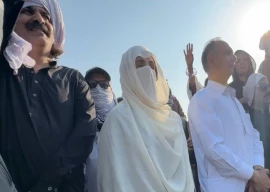
As the trophy hunting season progresses in northern Pakistan, a foreigner hunted an ibex, taking the number of hunted animals to three this year.
“A Lebanese national, Richard Haykel claimed a trophy because he was successful in the hunt,” an official of the forest department told The Express Tribune on Thursday.
Haykel hunted the ibex inside the Khunjerab National Park, after paying $3000 as hunting fee.
An American had killed two markhors last month, one of the most prized wild animals in the world which carries a hunting fee of $55,000. The government collects the hunting fee, 80 per cent of which is given to the local community. “The share paid to the community is a kind of reward for protecting wildlife from illegal hunting and poaching,” said an NGO official in Gilgit, the capital of Gilgit-Baltistan where trophy hunting lasts from December to April.
Meanwhile, authorities have arrested at least four people in another remote valley for illegally hunting a markhor, sources told The Express Tribune.
The incident occurred in Karambar valley in Ghizer, about 200 kilometres from Gilgit. Apart from six months’ imprisonment, violators can also be fined according to wildlife laws.
Published in The Express Tribune, January 13th, 2012.
COMMENTS (4)
Comments are moderated and generally will be posted if they are on-topic and not abusive.
For more information, please see our Comments FAQ



1732626034-0/BeFunky-collage-(92)1732626034-0-165x106.webp)



1732621030-0/Express-Tribune-(7)1732621030-0-270x192.webp)
1732622842-0/Express-Tribune-(9)1732622842-0-270x192.webp)

1725254039-0/Untitled-design-(24)1725254039-0-270x192.webp)






The government collects the hunting fee, 80 per cent of which is given to the local community. “The share paid to the community is a kind of reward for protecting wildlife from illegal hunting and poaching,” said an NGO official in Gilgit, the capital of Gilgit-Baltistan where trophy hunting lasts from December to April.
Strange logic. Killing is rewarded if government gets a cut. Otherwise it is punished.
Lets hope the community uses these funds responsibly and preserve wildlife as their livelihoods depend on it.
The animal in this picture is not a Himaliyan Ibex which is found in the northern areas of Pakistan. The Himaliyan Ibex has a thicker dark brown coat. Community based hunting is not only an excellent way of conservation but brings much needed revenue to the rural northern areas
I did an internship at WWF where they told us that they allow the hunt of some markhors after the hunters pay a large sum of money to gain the rights. This money is then used to help prevent the remaining population of this species as well as for breeding them and to spend on their population growth. Such steps are quite helpful because they help prevent illegal hunting and keep the population of the species stable while bringing forth money to help WWF achieve it's aims.